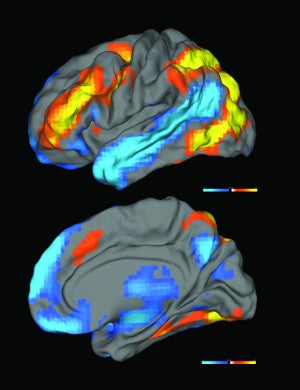discover
CHANGING HABITS
 photo: Courtesy of The Center for Excellence for Self-Management Advancement Through Research & Translation
photo: Courtesy of The Center for Excellence for Self-Management Advancement Through Research & TranslationThis image shows averaged findings from some participants in the healthy behaviors study. In red are analytic areas important for understanding health conditions and self-management instructions. In blue are empathetic brain areas important for motivation and a sense of well-being.
You need to lose a little weight, the doctor says. You need to exercise more. You need to cut back on salt. You need to quit smoking.
We're bombarded with health advice. Yet studies consistently show that many of us don't follow it, even when our lives are at stake.
"Finding a way to change behavior would be like finding the Holy Grail," said Shirley Moore, PhD, RN (GRS '79, health science education, NUR '91, GRS '93, nursing), associate dean for research at the Case Western Reserve Frances Payne Bolton School of Nursing and the Edward J. and Louise Mellen Professor of Nursing.
Moore leads a team of researchers conducting an ambitious $2.5 million project focused on the source of all behavior: the brain. Researchers want to see its response to health care messages. Then they hope to find ways to alter those responses.
The work is a project of the Center for Excellence for Self-Management Advancement through Research & Translation (SMART), which Moore directs. It is one of only two National Institute of Nursing Research-funded Centers of Excellence for Self-Management Research in the country and brings together researchers from universities, hospitals and nonprofits—mostly in Northeast Ohio—to study ways to teach people to adopt healthy behaviors.
In the current project, study participants undergo functional MRI (fMRI), which images their brains as they watch 20-second health information videos—some with an emotional message, others purely factual, and a third group with both.
The fMRI tracks brain blood flow, which indicates what parts of the brain respond to each type of video. The researchers want to see how efficiently each person's brain switches back and forth between the neural network that handles analytic information and the one that handles emotional information.
Research by Anthony Jack, PhD, associate professor in the Department of Philosophy, director of the Brain, Mind and Consciousness Laboratory at the university, and a member of the SMART center, has shown that the analytic network is suppressed when we're dealing with emotions, while social and emotional processing is suppressed when we engage in analytic processes, such as solving math equations. "The evidence indicates that if you don't suppress one network when you need the other, you function less well," he said.
Jack also is on Moore's team, which wants to build on his research. "Our hypothesis is that people who can switch back and forth are more likely to have the ability to change their behaviors," Moore said. After gathering brain-imaging results from study participants, researchers will test a variety of health interventions to see if they help individuals switch efficiently between the two networks.
One study already underway explores whether one intervention—mindfulness meditation—helps African-Americans with elevated blood pressure adopt a new blood pressure-lowering diet.
Other projects launched or in the works focus on preventing cardiovascular disease in HIV-positive adults and helping caregivers of critically ill family members with decision-making and stress management.
Ultimately, Moore and her colleagues hope to use the brain scans to create a simple test that can determine if an individual is more likely to change his or her behavior based on emotion-laden information or analytical information. The results could be used to select health care information tailored to a patient's motivational style.
"Just as we learned to be very precise about which medicine is prescribed and at what dose, we believe we can help patients by being more precise about what kind of information each patient receives," Moore said.






